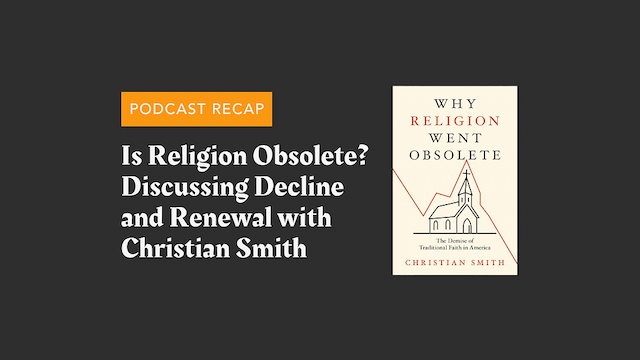Rejoicing in Roe Overturned

The March for Life, 2020 | Washington D.C.
I still can’t believe I’m writing this: after 50 years, Roe has been overturned. It’s just amazing to think that in our lifetimes a ruling that allowed for 63 million babies to be killed has now been thrown out and overruled. To be specific, we are not rejoicing that abortion is now illegal in the U.S.; it is not. States can now decide through their legislatures what they believe about abortion. We are not rejoicing that abortionists and people who have had abortions are getting some kind of restitution. We mourn that. Our response to sin should be repentance. But we are rejoicing that a ruling prohibiting anyone from standing in the way of abortion has been thrown out. Now we are able – in states like Oklahoma and many others – to stand up for the voiceless and oppressed, for the most vulnerable of all, and to make laws prohibiting abortions. We are finally able to do justice, to stand up and say no.
This is just the beginning of a new era in American life. Some states will make abortion legal without any limits (something they also were not able to do under Roe and Casey, but that point is not often discussed), others will outlaw abortion in ways some Christians find lacking nuance, and others will get it just right.
Christians and Abortion
As so many have pointed out, the opportunity to continue the incredible work of caring for mothers, babies, and families goes on and the stakes are now even higher. This is not a burden but a privilege.
Christians have taken a stand for the unborn and vulnerable from the very beginning. Starting with Jesus’s famous declaration, “let the little children come to me,” and continuing through history, Christians have always sought to end infanticide, take in orphans, and provide for the fatherless. The Didache is one of the earliest Christian documents after the New Testament and gives us an important glimpse into the early Church. There, the author(s) writes, “You shall not kill an unborn child or murder a newborn infant.” This has always been a distinguishing mark of following Christ – and so have adoption, foster care, caring for the sick and dying, and other ministries of mercies. It is the church that has spearheaded so many of these ministries and agencies in the U.S. today.
I don’t know if anyone could have handled this issue better than Lauren McAfee has over at the Gospel Coalition. If you’re looking for what’s next, read her article, “After Roe, How Do We Stand for Life?” and share it with everyone you know.
The Culture of Abortion
In many parts of the country, including our social media feeds and mainstream media outlets, this is a day of mourning, anger, and protest. Progressives have taken to the streets just as they threatened. If you have even a single bar of cell service, you’ve probably been flooded with different takes, stats, and narratives, some even from Christians lamenting the court’s ruling and castigating those who are celebrating.
What’s going on here?
It would be hard to find something more monumentally in line with God’s will than overturning Roe. Let’s not forget that adding moral issues together doesn’t cancel them out. The issue at the root of abortion is murdering an unborn child. It’s necessary that we take that issue head-on and then sort out anything else that might arise.
What about women who need healthcare? What about the foster care system? What about government reform with respect to the family? What about IVF? What about the price of adoption? What about people in poverty? What about the less than 1.5% of abortions that result from rape and incest? I’ll discuss some of these questions and objections on Monday, but for today, it’s sufficient to say that none of these issues gets better if you add abortion. That’s just not the way things work. We can address these problems through other God-honoring means. And we will.
Abortion Has Been a Cultural Idol
Christians have always been opposed for doing the right thing. Whatever the culture’s current idol is, there will be trouble if you touch it. My mind has gone many times to the story of Gideon in Judges 3. Before Gideon led his three hundred men against the army of Midian, he did something even more radical. God’s first call to Gideon was to get things right in his own home. Even though he was an Israelite from the tribe of Manasseh, his father had idols in the house. In the Promised Land, the Canaanites worshipped Baal and Asherah. Not long before this, Joshua had proclaimed, “As for me and my house, we will serve the Lord!” But in the house of Joash, they worshipped Baal.
First things first, before he can conquer Midian, he has to conquer the idolatry in his own clan. One night he dismantled the altar of Baal and cut down the Asherah pole. When the men of the town awoke, they realized someone had desecrated their altar. Someone had offended their gods. Someone had confronted them over their sin. The men of the town confronted Gideon and his father about their fallen gods; “Bring out your son, that he may die, for he has broken down the altar of Baal and cut down the Asherah beside it.”
These men wanted to kill Gideon for destroying their idol. These were Israelites! They were supposed to be worshipping God alone. No other gods, no graven images. They had become so accustomed to the ways of Canaan they had forgotten the ways of God. When Gideon did what was right, they reacted with anger. They wanted to kill him for preventing them from continuing something that would lead to their death. God’s act of grace through Gideon was met with rage from the culture around him.
The Bible is full of these examples. In Acts 19, Paul and his companions preach the gospel in Ephesus and so many people come to believe that the silversmith’s guild (the ones who were making the idols) revolted. Their profits had been hit by the work of God and their livelihood was falling into ill-repute. Instead of praising God and repenting, they rioted.
When Jesus cleansed the temple and opposed the Pharisees, they did not turn to God, they turned on Christ. Even as he came to destroy the power of sin and death, they handed him over to the Romans and demanded he be put to death.
A combination of verses from the wisdom literature captures the phenomenon we’re seeing right now:
“Why do the nations rage and the peoples plot in vain? The kings of the earth set themselves, and the rulers take counsel together, against the LORD and against his Anointed” Psalm 2:1-2
“When justice is done, it is a joy to the righteous but terror to evildoers.” Proverbs 21:15
The Shock of Godliness
The root issue is worldliness. In his book Losing Our Virtue, David Wells has one of the most penetrating definitions of worldliness: “anything that makes sin seem normal and righteousness seem strange.”
If slavery was America’s original sin, abortion has been American sin perfected. In both cases, sin was the norm. Righteousness seemed strange. Even many Christians were taken in by the normalcy and the cultural momentum of the sin of slavery. Today, sadly, too many Christians have been taken in by the worldliness of abortion culture. So many of the sound bites defending abortion make absolutely no sense if you hold to basic tenets of a Christian worldview: God opens and closes the womb. Children are a gift from God. Sex outside of marriage is wrong and it has painful consequences. Taking care of other people is not optional. Caring for widows and orphans is at the heart of living the Christian life. Some of these sentences sound radical if your ears are tuned to the worldy culture we live in. It’s a battle to tune our ears so that godliness sounds normal and sin sounds strange, but by the Spirit, that’s our goal.
In the course of following Jesus, there will always be opposition, gotcha questions, distorted facts, warped narratives, accusations, if-this-then-thats, and every manner of creativity bent against God’s will. There will be time to sort through the sound bites and catchphrases. But today, we should ignore all of that and thank God for his mercy in America. The legacy of Roe v. Wade, a legacy that led to 63 million babies being killed, is now over. In the last 50 years, an average of 3,500 babies were aborted every single day. Today that number is much smaller. The cover for the greatest genocide in history has been removed. There are babies alive right now who would not have lived had they been conceived just months ago. We rejoice and give God thanks for that.
Dr. Cole Feix is the founder and president of So We Speak and the Senior Pastor of Carlton Landing Community Church in Oklahoma.










